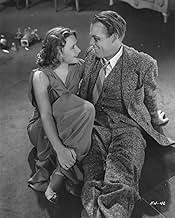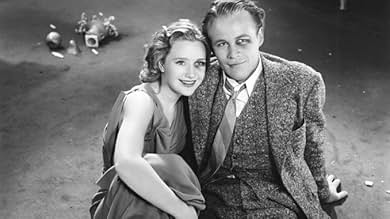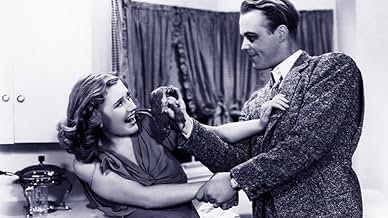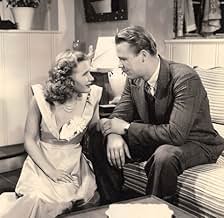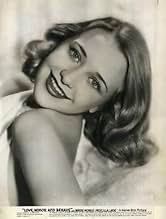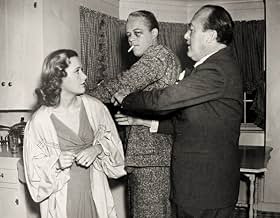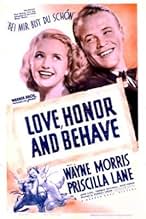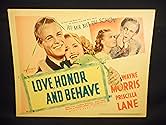Aggiungi una trama nella tua linguaA woman raises her son Ted to be a good loser, in effect creating a weakling who never asserts himself. Even after marrying his childhood sweetheart Barbara and assuming family obligations, ... Leggi tuttoA woman raises her son Ted to be a good loser, in effect creating a weakling who never asserts himself. Even after marrying his childhood sweetheart Barbara and assuming family obligations, Ted cannot bring himself to fight for respect. The worm finally turns when Barbara starts ... Leggi tuttoA woman raises her son Ted to be a good loser, in effect creating a weakling who never asserts himself. Even after marrying his childhood sweetheart Barbara and assuming family obligations, Ted cannot bring himself to fight for respect. The worm finally turns when Barbara starts stepping out on her Milquetoast husband, who then turns out to be not so passive after all... Leggi tutto
- Regia
- Sceneggiatura
- Star
- Sally Painter
- (as Barbara O'Neill)
- Party Guest
- (non citato nei titoli originali)
- Party Guest
- (non citato nei titoli originali)
- Boy Playing with Young Ted
- (non citato nei titoli originali)
- Little Girl
- (non citato nei titoli originali)
Recensioni in evidenza
The story begins with Ted as a child (Dickie Moore). He's stuck between extremes with his parents. His father wants the kid to be a he-man and a tough guy whereas his mother wants him to be passive and 'a good sport'. Well, his parents soon divorce and mother's influence wins out....and as Ted grows (Wayne Morris), the kid is now a wimpy man who won't stand up for himself. This is much worse because he also won't fight for his marriage and you can see that his wife (Priscilla Lane) is disappointed in him and doesn't think he's much of a man. Will Ted continue this or will he learn to be a man?
The film is entertaining...but also disturbing because the ending essentially says that when your wife is being a jerk, slap her around and show her who's boss. Couldn't there be something a little less extreme?! I do think standing up for right and wrong and fighting is good...but the film definitely crosses the line to spousal abuse. Overall, an interesting but seriously flawed story.
By the way, at the end, the couple being having a fist fight and both INSTANTLY have bruises on them...which is utterly ridiculous...and nasty.
The conflict is resolved in an almost slapstick manner by the young marrieds (Morris, Priscilla Lane) that is steeped in just enough physical injury to make it unfunny and unromantic in the extreme. Given that none of the players from Mitchell on down seem to believe any of the lines they're spouting, and that the flat direction gives us nothing to appreciate in the acting or staging up to that point, it's almost a relief when this picture's final credits ("blame" might be more appropriate) unspool. (Even Dick Foran, who was accustomed to playing unsubtle lunkheads -- a role he later aspired to in real life -- looks uncomfortable here). And of course, the fact that it took four credited screenwriters to deliver the script for this 71-minute time-filler should be a warning to the unwary.
If you're looking for a good movie about marital conflict and resolution from this decade, see William Wyler's DODSWORTH. LOVE, HONOR AND BEHAVE is closer to Jiggs and Maggie, and painful to watch, especially given our awareness that everyone involved (including underlying author Stephen Vincent Benet, whose output included "The Devil And Daniel Webster") was capable of so much more than what we see here.
In the present, Mr. Morris and Ms. Lane meet each other as attractive young adults. Morris' parents are still concerned about his meekness. His father wants him to play a rough contact sport like football, but Morris plays tennis at Yale; his mother wants "mama's boy" Morris to be a doctor, but he lacks determination and interest. Childhood "sweethearts" Morris and Lane are very much in love, but his mild manner threatens their happiness. Aggressive Dick Foran (as Pete Martin) also desires Lane...
Lane sings a nice version of The Andrews Sisters' colossal introductory hit "Bei Mir Bist du Schoen" (1937), which put the singing sisters on the map. This is a well-structured story, but ends with a scene promoting violence; Lane's arousing "spanking" is fine, but the characters show visible wounds ("black eyes") resulting from an audibly vicious fight, which is celebrated by much of the cast. By the way, watch for Morris to lose the small hairpiece that covers his "bald spot" during the fight.
Equating contact sports and sex play with domestic violence scores no points.
*** Love, Honor and Behave (3/12/38) Stanley Logan ~ Wayne Morris, Pricilla Lane, Dick Foran, Thomas Mitchell
I did enjoy most of the acting, even though Lane comes on a bit too aggressive for my taste, and very hostile to her mother-in-law. The supporting players, including the child actors, give very competent performances.
An example of how ridiculous the premise is made when Wayne Morris, the hero, who was raised by his mother, is criticized for preferring tennis to football, by macho old dad. Dad had even criticized Mom for not "fighting" (literally) for him earier in the movie. Well,Wayne falls for childhood girlfriend Priscilla Lane, whose philosophy is not unlike that of his schmuck father's. Priscilla wants a man who looks good, (as does Wayne Morris) but she wants him to be as physical and morally ambiguous as his father was. Very soon tere are marital problems because hero can't find a decent job (it's the depression and he quit med school to marry her). She still wants to party with a male friend while Morris wants her to stay home discuss a job that would mean their living on a lot less.
The "happy ending" and our "lesson in life" is when she manipulates him into physically fighting the guy who comes to take her out, and physically abuses her for not sticking with him. Both sets of parents watching from outside the front window (and are amazingly amused and satisfied) are told by Priscilla Lane's character to "leave them alone" (She appears tojoy his new-found penchant for domestic violence). The "older folks" present think it's all cute.
It's a movie with good actors but it's message makes it really difficult to watch. Unfortunately, I'm afraid that there are some people who may watch this movie and think of it as merely a screwball comedy, with an appropriate message. I pity them.
Lo sapevi?
- QuizThomas Mitchell (Dan Painter) and Barbara O'Neil (Sally Painter) played Tara plantation owners, and parents of Scarlett (Vivien Leigh), Gerald and Ellen O'Hara in Gone with the Wind (1939).
- Citazioni
Barbara Blake: Ted is the only man I ever saw I could stand over orange juice and coffee. You know, Jim, it makes a lot of difference how they look in the morning.
Jim Blake: Barbara!
Barbara Blake: I read that somewhere, darling.
- Colonne sonoreBei Mir Bist Du Schön
(1932)
Music by Sholom Secunda
Original lyrics by Jacob Jacobs
English lyrics by Sammy Cahn and Saul Chaplin
Sung by Priscilla Lane (uncredited)
Variations played throughout as part of the score
I più visti
Dettagli
- Data di uscita
- Paese di origine
- Lingua
- Celebre anche come
- Everybody Was Very Nice
- Luoghi delle riprese
- Reno, Nevada, Stati Uniti(establishing shot, archive footage)
- Azienda produttrice
- Vedi altri crediti dell’azienda su IMDbPro
- Tempo di esecuzione
- 1h 11min(71 min)
- Colore
- Mix di suoni
- Proporzioni
- 1.37 : 1

